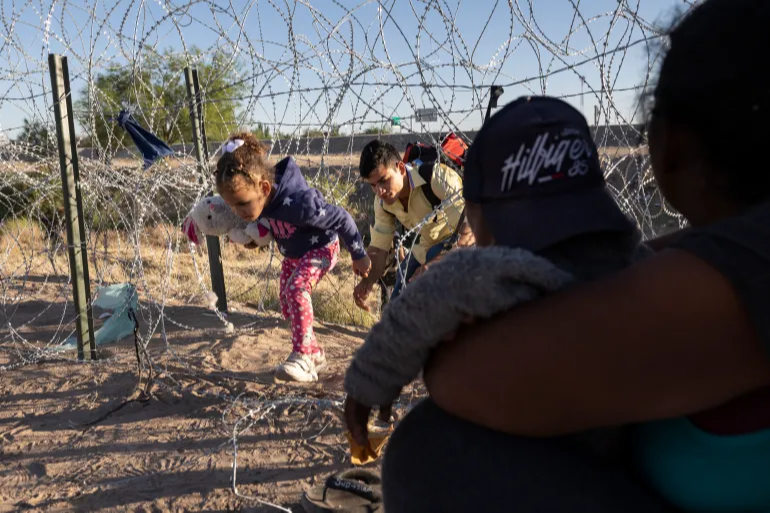
Children cross from Mexico into the United States to seek asylum [File: John Moore/AFP]
Washington, May 10 (RHC)-- U.S. President Joe Biden’s administration is preparing for the end of a controversial public health order that has allowed authorities to turn away most asylum seekers at the United States border with Mexico.
Biden held a call with his Mexican counterpart Andres Manuel Lopez Obrador on Tuesday -- just two days before the Title 42 policy is set to expire -- and the leaders pledged to bolster cooperation on the border.
“They discussed continued close coordination between border authorities and strong enforcement measures,” the White House said in a readout of the talks. “Both leaders underscored the value of managing migration in a humane and orderly fashion with expanded legal pathways and consequences for irregular migration,” it said.
First imposed by former U.S. President Donald Trump at the start of the COVID-19 pandemic in March 2020, Title 42 effectively allowed U.S. border authorities to rapidly turn away most asylum seekers arriving at the border, without offering them an opportunity to apply for protection. The policy has drawn widespread condemnation from rights advocates who argue it forces migrants and refugees back to unsafe Mexican border cities and violates U.S. obligations under international law.
Speaking to reporters earlier on Tuesday, White House spokesperson Karine Jean-Pierre maintained that the Biden administration was ready to handle an expected influx in border arrivals when the rule expires on Thursday. “Right now we believe we have a robust plan, a multi-agency plan, to do this in a humane way,” said Jean-Pierre, stressing that Washington is pursuing a policy of “enforcement, deterrence and diplomacy.”
The White House announced last week that it was sending an additional 1,500 U.S. troops to the border in anticipation of the end of Title 42. The Republican governor of Texas, Greg Abbott, said on Monday that he planned to deploy the state’s new “Texas Tactical Border Force,” under the auspices of the Texas national guard.
And on Tuesday, U.S. Customs and Border Protection agents launched a “targeted enforcement operation” in the Texas city of El Paso, a key point along the border that has seen an increase in irregular crossings in recent days.
The Department of Homeland Security also said it would reduce the flow of legal travellers across the Paso Del Norte port of entry to focus on security. El Paso, as well as two other Texas cities, Brownsville and Laredo, have declared a state of emergency as they struggle to cope with hundreds of people – most from Latin America and some from China, Russia and Turkey – who are already there.
El Paso Mayor Oscar Leeser said the city was readying for many more on Friday, judging by a recent tour of the neighbouring Mexican city of Ciudad Juarez. “On the street, we estimated somewhere between eight to 10,000 people,” Leeser said.
Meanwhile, in Arizona, Democratic Governor Katie Hobbs has said the state will transport people who cross the border irregularly to other parts of the US to help with the added arrivals. Already, humanitarian groups have said the number of people gathering near the border has sharply increased in recent days in anticipation of the end of Title 42.
In Matamoros, Mexico, migrants and refugees were buying pool floats and life jackets to prepare to cross the Rio Grande River into Brownsville, Texas, migrant rights activist Gladys Canas told the Reuters news agency.
In Tijuana, across from San Diego, California, asylum seekers formed long lines in front of a towering border fence on Monday with the aim of turning themselves in to U.S. border agents. Those hoping to claim asylum have expressed frustration with the CBP One app, which they are expected to use to schedule appointments to seek entry into the United States.
Amnesty International has said the requirement “severely limits asylum seekers’ ability to seek international protection.”

